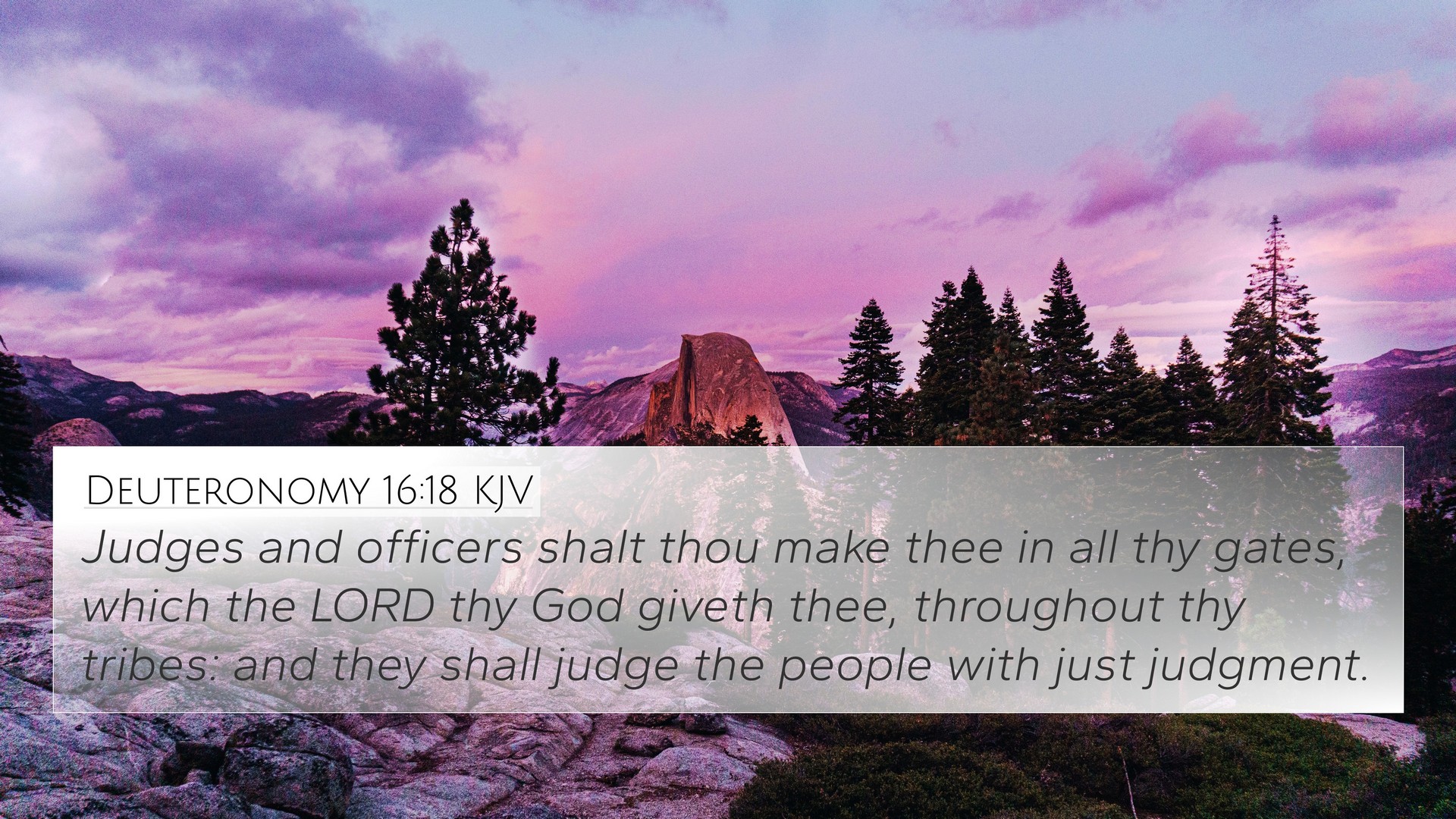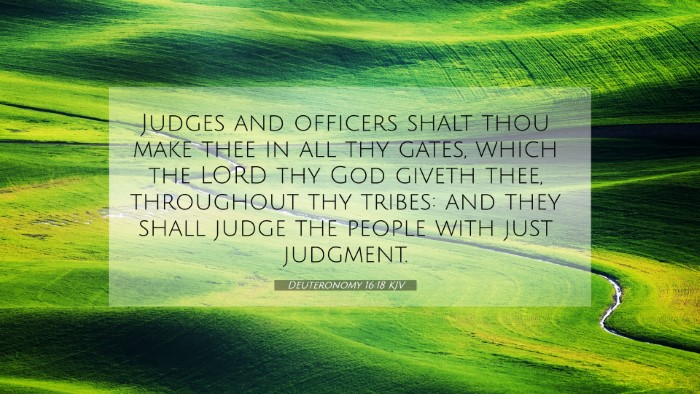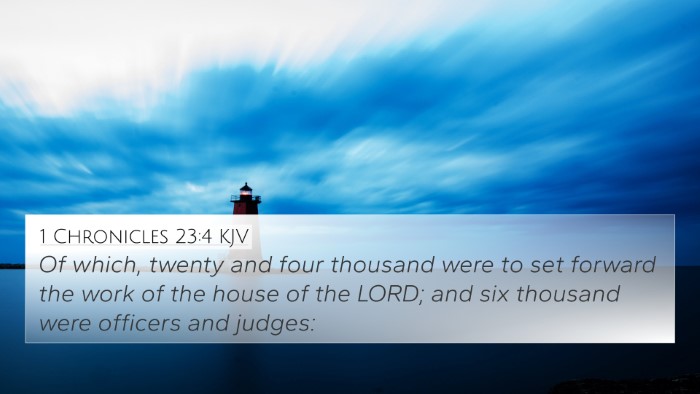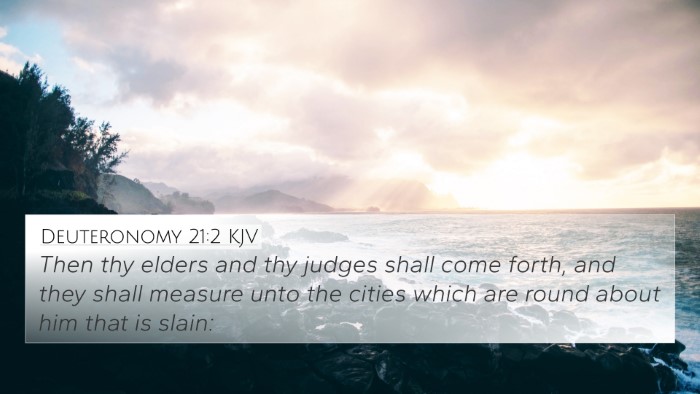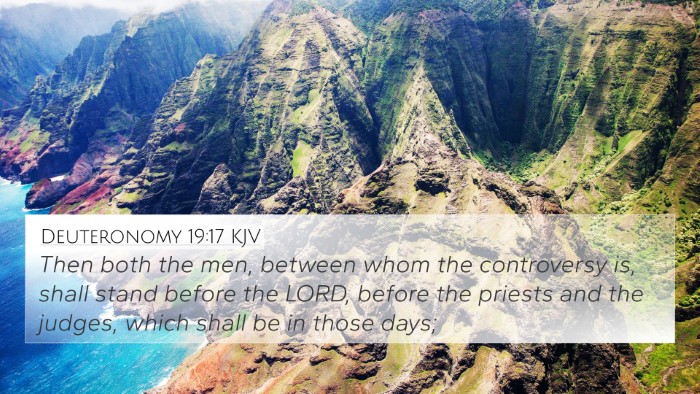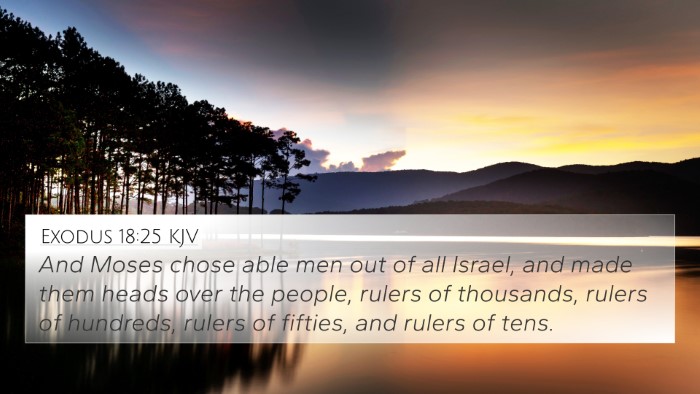Deuteronomy 16:18 - Understanding the Verse
Verse: "You shall appoint judges and officers in all your towns that the Lord your God is giving you, according to your tribes, and they shall judge the people with righteous judgment." (Deuteronomy 16:18, ESV)
General Overview
This verse calls for the establishment of a judicial system among the Israelites. It emphasizes the necessity of appointing judges and officers who are responsible for governing fairly and righteously. This was fundamental for maintaining order and justice in the community.
Insights from Commentaries
-
Matthew Henry:
Henry emphasizes that the appointment of judges and officers is essential for executing the law and maintaining judgment. This system of governance reflects the character of God, who is righteous and just. The people are reminded that they need to choose leaders who are capable of making decisions impartially and according to the law of God.
-
Albert Barnes:
Barnes points out that this directive is a means to ensure justice in all matters. The judges appointed must come from their tribes, suggesting a communal approach whereby the leaders understand the people’s circumstances. Barnes reiterates the importance of judges being unbiased, emphasizing righteousness as a characteristic that must be present in their judgments.
-
Adam Clarke:
Clarke elaborates on the societal implications of this verse, stating that it lays the foundation for a just society where leaders are accountable to those they serve. He stresses that the officers referred to are not merely enforcers but also educators of the law, ensuring that the people live according to divine regulations.
Key Themes and Lessons
- Justice and Fairness: The emphasis on righteous judgment highlights the importance of equity in governance.
- Community Leader Accountability: The selection of judges from among the tribes fosters a sense of local accountability.
- Divine Guidance: The premise that the Lord your God is guiding this process signifies the spiritual foundation of the judicial system.
Cross-References for Deuteronomy 16:18
Understanding Deuteronomy 16:18 is enriched by examining related verses. Here are some relevant cross-references:
- Exodus 18:21-22: Advises on selecting capable leaders to assist Moses in judging the people.
- Leviticus 19:15: Commands just judgment and impartiality among the people.
- Proverbs 29:2: Discusses the responsibilities of leaders in the context of the people's well-being.
- Deuteronomy 1:13: Moses seeks wise men to help determine just decisions.
- Proverbs 31:9: Advocates for speaking up for the rights of the poor and needy.
- Matthew 7:1-2: Encourages fair judgment, reminding that the measure we use will be used against us.
- Romans 13:1-4: Discusses the role of governing authorities established by God for good.
Thematic Connections between Bible Verses
The principle of appointing judges connects with several biblical themes:
- Accountability in Leadership: This is consistently addressed throughout scripture, particularly in the New Testament where church leaders are also instructed to be above reproach (1 Timothy 3:2).
- Divine Justice: The idea that God desires justice is echoed in both Old and New Testaments, forming a dialogue between the two.
- Integrity in Governance: Biblical texts on the importance of integrity in leaders abound (Psalm 82:3-4).
Tools for Cross-Referencing
When studying Deuteronomy 16:18 or any verse, several tools are useful:
- Bible Concordance: A great resource for locating verses by keywords.
- Bible Cross-Reference Guide: These guides offer thematic connections and directly related scriptures.
- Cross-Reference Bible Study: Techniques for understanding the interrelationships between the scriptures.
Conclusion: The Importance of Just Governance
Deuteronomy 16:18 calls not only for the appointment of judges but also for the principles of justice and accountability to underpin their actions. This foundational scripture resonates with the ongoing necessity for righteous leadership, which is echoed through numerous other passages in the Bible.
